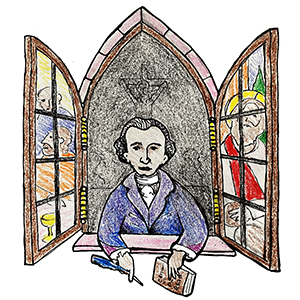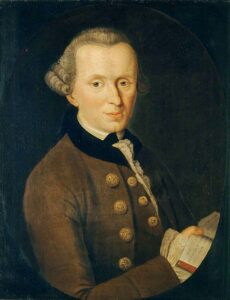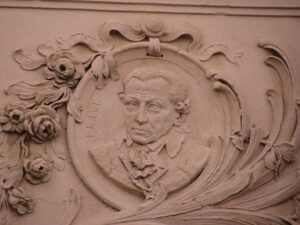Kant After Three Centuries
April 22, 2024 was Immanuel Kant’s three-hundredth birthday. Kant is the most influential modern European philosopher, viewed as a direct ancestor by both the European continental and the Anglophone “analytical” traditions. His philosophy, and the revolution (or revolutions) it set in motion, mark the point of division between early modern and later modern philosophy. Kant is studied not only in Europe and the Americas, but also prominently in the Far East and throughout the world. As we enter the fourth century of his influence, it makes sense to ask what Kant might have to teach us for the future, though we cannot with any confidence pretend to the ability to answer that question. It is one of the lessons of Kant’s own philosophy – stated forcefully in the opening sentence of the Critique of Pure Reason — that human reason is driven by its own needs to ask questions it can never answer (KrV Avii).

Artist: Drew Martin
We can ask, for example, what Kant’s philosophy of right and politics might say about the current political situation, in which the world is threatened by a return to authoritarianism and reactionary nationalism in many places. Kant himself lived his entire life under an authoritarian military despotism. He treated it as a legitimate condition of right, but he hoped for political progress in the form of a representative republic respecting the rights of all citizens. He regarded as a sign of the moral progress of the human species that enlightened observers everywhere felt enthusiasm for the ideals of the French Revolution, and Kant retained that attitude even after the course of events in France led him to question whether in light of the turmoil of the Terror, the human race would want to undertake such a venture a second time (SF 7:85). Kant believed in the nation state, declaring that a single world-government would be “the graveyard of freedom” (EF 8:367). Despite that, he was a cosmopolitan, who hoped for a federation of states maintaining peace in the world. It was quite consciously Kant’s vision that inspired the founding of the League of Nations after World War I and the United Nations after World War II. Kant also entertained the thought of a World Republic, whose members would themselves be sovereign states, and that could maintain a just peace among them (I 8:24-26, EF 8:343-386).
Kant’s thought on human biology, inspired by Linnaeus and Blumenbach, led him to favor a theory of monogenesis for the human species rather than seeing different races as having distinct biological origins. But he also adopted a version of Linnaeus’ theory of four human races with a racialist hierarchy among them. Kant is prominent among those who influenced the racist pseudo-science that dominated European and American physical anthropology in the nineteenth and twentieth centuries. He has been widely criticized for this in the last generation or so. But probably the most thoughtful of these critics was the late Charles Mills, who in moral and political philosophy was himself explicitly a Kantian, and described his own position as “black radical Kantianism” (Mills, 2017). Further, when Kant turned his attention from biology to politics, he was a severe critic of European imperialism throughout the world, and praised those non-Europeans who restricted the access of Europeans to their territories (EF 8:357-360).

In fact, twentieth- and twenty-first century criticism of racism, sexism and other forms of ethnic supremacy and hatred have usually been based mainly on Kantian ethics, and its defense of the dignity of all human beings as ends in themselves. The definitive formula of the moral law for Kant is the formula of autonomy, which represents morality as legislated by and to each of us by our own reason (G 4:427-429). The variant of this formula is the formula of the realm of ends, which represents all rational beings as constituting a single ideal moral community bound by moral duties whose perfect observance would bring the ends of every rational being into harmony with the ends of every other (G 4:433-435). Because Kant represents morality in legal or even forensic terms, as a moral law, and conscience as an inner court through which each of us finds ourselves either guilty or innocent in relation to our moral choices, Kantian ethics has often been seen as cold, “legalistic” in a bad sense of the term, and even hostile to human emotions. That is a grotesque caricature, but perhaps understandable due not only to the difficulty and obscurity of Kant’s writing, but also to the fact that people have mainly read his foundational ethical writings – the Groundwork and the Critique of Practical Reason – that are not focused on the questions they bring to Kant’s writings rather than the works (such as the Doctrine of Virtue in the Metaphysics of Morals) which do take up those questions.
Kant belongs to a tradition in moral philosophy in which the fundamental moral concept is obligation, which he understands in terms of obedience to the moral law. But the aim of the moral life for Kant is not only obedience, but chiefly virtue. And virtue for Kant consists in what he calls “goodness of heart” (R 6:29, 50; cf. G 4:410, KpV 5:156, MS 6:441) respect and love, united and kept in balance. Virtues and vices for Kant, as for Aristotle, consist not only in what we do, but also in what we feel and desire. So our moral duties consist prominently in our cultivation of the virtues of love: benevolence, gratitude and sympathetic participation in the situation of others and of respect for their dignity as rational beings. The vice of ingratitude includes the resentment we may feel toward someone whose generosity toward us makes us feel obligated to return their favors. The vices opposed to love, envy, for example, consists not only in hostile acts toward our rivals, but also in wishing them ill, and being distressed by their success and good fortune. The vices of defamation and ridicule, opposed to respect, consists not only in the spreading of stories (even true ones) that bring others into ill-repute and derision, but also in gloating and gaining satisfaction when they bring disgrace and mockery on themselves (MS 6:452-457, 458-459, 466-468).
Above all, Kantian ethics is an ethics of caring: Caring for others who need our love and respect, and caring about ourselves and the kind of person we are. When Kant speaks of “duty” (Pflicht), we ought to hear its relation to the German verb pflegen (to care for). Our duties are what should matter to us. Even in our relation to non-rational animals, in regard to which Kant thinks we have duties analogous to those we have toward humans (VE 27:459); and an important part of why we should care about them is that we can see they care – about their own kind, about their young, even about us humans. “The more we devote ourselves to observing animals and their behavior,” Kant says, “the more we love them, on seeing how greatly they care for their young; in such a context we cannot even contemplate cruelty to a wolf” (VE 27:710). This central feature of Kantian ethics is at least as badly needed today as it was in the eighteenth century.
In some ways, however, the most fundamental virtue in Kant’s ethics is truthfulness or honesty. Kant is often caricatured based on gross misunderstandings of a late, brief essay in which he seems to hostile readers to be saying that we must tell the truth even to a murderer who asks us where his intended victim is hiding. But a careful reading of that essay (which it has all too seldom received) reveals that Kant’s only real point is that in a special class of cases where truthfulness is a matter of right – as in the cases of testimony in court or declarations in a contract – our obligation to be truthful is owed to humanity in general even in cases where the person to whom we are speaking has forfeited (for example, by his criminal intent) the right not to be lied to (VRL 8:425-430; cf. Wood, 2008, Ch. 14). But today the importance of truthfulness in our public life, and especially our politics, is an area in which it should be obvious that Kant’s strict views on issues of truthfulness and lying are badly needed. Those who want to quibble with them and offer clever and cynical rationalizing defenses of mendacity ought to be ashamed of themselves. Such critics are part of the problem, not part of the solution.
Kant’s strict views on truthfulness led him to criticize the policies of the Prussian government when they tried to compel clergy and academics, in violation of their own consciences, to preach and teach outdated and superstitious versions of Christian religious doctrine in which educated people could no longer believe (MVT 8:253-271, R 6:185-190), ED 8:336-339). It was this which brought him into conflict with the authorities over his teachings on religion. Kant was no enemy of religion. On the contrary, he thought religious community was essential to humanity’s moral progress. But he held that ecclestiastical faiths can fulfill their true religious vocation only if they interpret traditional doctrines in ways that bring them into harmony with reason and science (R 6:93-102). Today the freedom of religious conscience that Kant defended is as badly needed as it was two and a half centuries ago during the Enlightenment. In religious traditions throughout the world, backward traditional understandings of religious doctrine are a direct threat to honest thinking and human rights. Kant’s teachings on these topics are therefore again of vital importance.

Kant’s emphasis on honesty is in this way closely related to the topic of enlightenment (Aufklärung). Kant revised the very concept of enlightenment by drawing out what is really at issue. He defined ‘enlightenment’ as the human being’s exit from self-incurred minority (selbstverschuldete Unmündigkeit) (WA 8:35). Kant’s claim is that we are all to some extent in a condition of minority or tutelage, like the condition of children, who need a guardian (Vormund) to direct their lives for them. But many of us adults let ourselves remain in a condition of minority that is selbstverschuldet or our own fault. We do this out of laziness, habit, or fear (fear of taking responsibility for our own thoughts and our own lives). The most degrading form of this minority, in Kant’s view, occurs in religion, where we let a clergyman or holy book, or its unthinking traditional interpretation, usurp the authority of our own conscience. Enlightenment, as Kant understands it, is releasing ourselves from this false minority, by learning to think for ourselves (WA 8:35-42, O 8:141-146).
To think for oneself, as Kant means it, is not being stubborn, contrarian, still less thinking selfishly or self-interestedly (as the war criminal-dictator Vladimir Putin has recently presented it). All that is merely another form of childishness or immaturity. Kant holds that thinking for oneself is making the basis of your thought something that is valid for all thinkers (O 8:146n).
During the 1780s, Kant develops this into three rules or maxims for all our thinking, which he associates with the sensus communis or common sense (KU 5:294-296, cf. Ak 25:1480, cf. Ak 15:715; Anth 7:220, 228; VL 9:57). The first rule: Think for yourself, which Kant describes as “freedom from prejudice,” therefore, leads in Kant’s view to a second rule: Think from the standpoint of everyone else, or “broadmindedness in thinking” (KU 5:294-295). You should not, therefore, despise or reject the thoughts of others, even those of the clergyman or the traditional reading of the holy book. The point is rather to accept the thoughts of others, but critically and maturely, not deferring to them but taking responsibility for your own thoughts and actions, like an adult. In his thought about religion, Kant even holds that we need religious community for our own moral improvement, but that traditional religious communities need to be reflective and reformist, reinterpreting their holy books to bring them into harmony with rational morality. Kant ran into problems with the Prussian state over his own writings on religion, and for at time was forbidden to lecture or write on the subject (SF 6:6-10).
The ultimate aim of thinking for oneself, according to Kant, is the third rule: Think consistently. This means not only that you should not contradict yourself, but also that your thoughts should harmonize and be mutually supporting. Kant held that none of his three rules can be followed perfectly or completely. We should always be striving to follow them and self-aware about the extent to which we do not, and perhaps cannot, think for ourselves, from the standpoint of others, and self-consistently. Kant held that he was not living in an enlightened aga, but in an age of enlightenment – an age in which people were becoming enlightened. No one, for Kant, is ever completely enlightened, and no one can become enlightened just by resolving on our own. Kant holds that people can become enlightened only collectively and as a community; and that they do this through free and open communication.each of us freely expressing our own thoughts, we learn how to think for ourselves and we encourage others to think for themselves. There is no enlightened elite whose task is to enlighten others. It is instead the task of each of us to enlighten both ourselves and others by communicating freely with one another.
It is no accident that Kant’s ethics was an ethics of autonomy or self-government, and Kant’s political philosophy or philosophy of right was based on what he considered the only innate human right, the right to freedom from being constrained by the will of others, but only to the extent that our freedom leaves others equally free according to universal law. Kant’s moral and political philosophy was designed for an age of enlightenment: an age in which people were gaining the freedom to think for themselves, which means also from the standpoint of others, and consistently, so that the human community can be a community of free, rational and caring beings acting toward each other with love and respect.
Kant thought that if we are free to communicate, enlightenment will eventually happen inevitably (WA 8:36-37). I think we have learned to our sorrow that here Kant was too optimistic. In the age of the internet, social media and propaganda, we have seen how what has been represented as freedom of communication can easily lead to lies, disinformation and new forms of tutelage or minority and illegitimate authority created under the false pretense of freedom. What we have to learn from Kant today is that his goal is more urgent than ever, but its pursuit is beset with more obstacles than he realized. It is our task to understand and overcome these obstacles. But it is also a Kantian task to do this, and to face up to the difficulty of doing it. For the meaning of ‘critique’ in Kant’s philosophy is the acknowledgment and the self-knowledge to be aware that there are questions we must ask, but can never answer.
Kant’s philosophy, especially in religion and in relation to human history, was based on a principled hope for the progress of the human species and a providential order of the world. But what is perhaps the most difficult lesson of enlightenment, of autonomous adulthood, is that we must maintain this hope while also taking responsibility for governing our lives in a condition of sober uncertainty concerning the questions that matter most to us.
References
Writings of Kant
Ak Immanuel Kants Schriften. Ausgabe der königlich preussischen Akademie der Wissenschaften (Berlin: W. de Gruyter, 1902-). Unless otherwise footnoted, writings of Immanuel Kant will be cited by volume:page number in this edition.
Ca Cambridge Edition of the Writings of Immanuel Kant (New York: Cambridge University Press, 1992-) This edition provides marginal Ak volume:page citations. Specific works will be cited using the following system of abbreviations (works not abbreviated below will be cited simply as Ak volume: page).
Anth Anthropologie in pragmatischer Hinsicht (1798), Ak 7
Anthropology from a pragmatic point of view, Ca Anthropology, History and Education
ED Das Ende Aller Dinge, Ak 8
The End of All Things, Ca Writings on Religion and Natural Theology
EF Zum ewigen Frieden: Ein philosophischer Entwurf (1795) , Ak 8
Toward perpetual peace: A philosophical project, Ca Practical Philosophy
G Grundlegung zur Metaphysik der Sitten (1785), Ak 4
Groundwork of the metaphysics of morals, Ca Practical Philosophy
I Idee zu einer allgemeinen Geschichte in weltbürgerlicher Absicht (1784), Ak 8
Idea toward a universal history with a cosmopolitan aim, Ca Anthropology History and Education
KrV Kritik der reinen Vernunft (1781, 1787). Cited by A/B pagination.
Critique of pure reason, Ca Critique of Pure Reason
KpV Kritik der praktischen Vernunft (1788), Ak 5
Critique of practical reason, Ca Practical Philosophy
KU Kritik der Urteilskraft (1790), Ak 5
Critique of the power of judgment, Ca Critique of the Power of Judgment
MVT Über das Mißlingen aller philosophischen Versuche in der Theodicee, Ak 8
On the Miscarriage of All Philosophical Trials in Theodicy, Ca Religion and Rational Theology
MS Metaphysik der Sitten (1797-1798), Ak 6
Metaphysics of morals, Ca Practical Philosophy
O Was heißt: Sich im Denken orientieren? (1786), Ak 8
What does it mean to orient oneself in thinking? Ca Religion and Rational Theology
R Religion innerhalb der Grenzen der bloßen Vernunft (1793-1794), Ak 6
Religion within the boundaries of mere reason, Ca Religion and Rational Theology
SF Streit der Fakultäten (1798), Ak 7
Conflict of the faculties, Ca Religion and Rational Theology
VE Vorlesungen über Ethik, Ak 27, 29
Lectures on Ethics, Ca Lectures on Ethics
VL Vorlesungen über Logik, Ak 9
Lectures on Logic, Ca Lectures on Logic
VpR Vorlesungen über die philosophische Religionslehre, Ak 28
Lectures on the Philosophical Doctrine of Religion, Ca Religion and Rational Theology
VRL Über ein vermeintes Recht aus Menschenliebe zu lügen, Ak 8
On a supposed right to lie from philanthropy, Ca Practical Philosophy
WA Beantwortung der Frage: Was ist Aufklärung? (1784), Ak 8
An answer to the question: What is enlightenment? Ca Practical Philosophy
Other sources cited:
Mills, Charles W. (2017), “Black Radical Kantianism,” Res Philosophica 95 (1):1-33.
Wood, Allen (2008). Kantian Ethics. Cambridge; Cambridge University Press.

